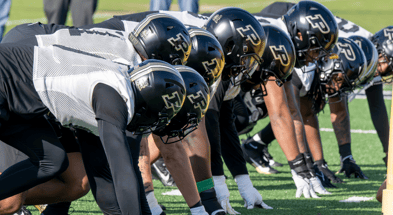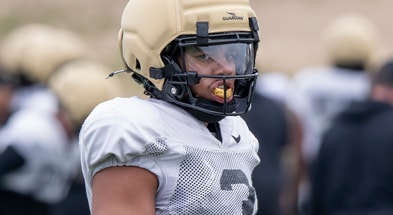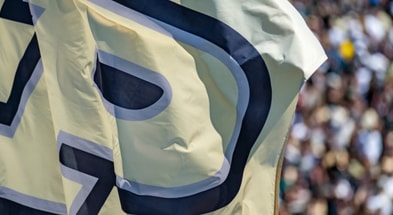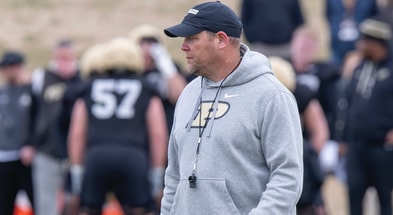Express Thoughts: The House Case, Braden Smith’s Award and more

GoldandBlack.com’s Express Thoughts from the Weekend column, with analysis of Purdue football, Boilermaker men’s basketball, recruiting, or whatever else comes to mind.
ON THE HOUSE CASE
On the very day of the national title game, the focus around college sports shifts from one court to another, as federal judge Claudia Wilken of the Northern District of California — a.k.a the Big Ten footprint — is scheduled to issue her final ruling on the landmark House case, though I’ve been told it may not come down immediately.
Provided it passes, it means another iteration of the NCAA, which has probably changed more in the past five years than it did in the prior 50.
What the House settlement, provided its passage, could result in: New normalcy and some measure of sanity and order. I don’t know if you’ve noticed or not, but sanity isn’t really college football’s or college basketball’s thing.

Look, healthy skepticism of enforcement’s ability to put any teeth to the cheating that has been going on for generations, but has been legal for the past few years, is appropriate. People are still going to pay players (more than they’re supposed to) to get them. A lot of it will just go back under the table and as far as the NCAA’s ability to stop it, yeah, well … we’ll see. But it will have both a court order and an accounting firm at its back, and you do not want to fight accountants. But it also could balance the landscape a bit, so the big ones aren’t eating the little ones quite as much.
Anyway, we’ll see on the enforcement part of this, but this all should be a net gain for Purdue, which has navigated chaos swimmingly in men’s basketball, not so much in football.
First off, know this: Purdue is going to be competitive financially. It has already committed to meeting the $20-plus-million cap of revenue that can be rationed to athletes. That doesn’t happen without commitment and alignment top to bottom, from the university on down to the athletic department.
That commitment in itself is an advantage because not every school is gonna be able to swing it.
But there are other sub-category angles to this, too.
Purdue sponsors a minute number of sports. No, it won’t be allotting money to every sport, but the shallow pool make decisions pretty cut-and-dry. It’s 1. football, 2. men’s basketball, 3. women’s basketball and 4. volleyball. Meanwhile, Nebraska will have to pay its volleyball players revenue-sport money, Minnesota will have to pay its hockey teams, Penn State its gymnasts and Iowa its wrestlers.
There are advantages now in an odd kind of way in Purdue historically being pretty mediocre in its Olympic sports, outside of golf and some real individual success in sports like swimming and wrestling, situations where legit NIL will still be in play. Could retention become an issue? Yeah, maybe, but everything’s fluid all the time anyway now and there’s not a power-conference program in America right now that wouldn’t choose a well-heeled football program over a contented swimming team. This is pretty callous stuff to say, but this will be a callous sort of climate.
Beyond that, if this does anything to stem the Studio 54 NIL Era of “We’ll give you $50 million to come here,” good for places like Purdue, who aren’t going to be morons about this stuff and like everybody else, could appreciate some clarity in the marketplace, which is going to be Burning Man until July 1 as everybody has to use their banked NIL money before July 1, or else they’re a college basketball taking timeouts with him into halftime.
We’ll see how this all turns out 10 years from now, but in the short term, this is a transformational moment for college sports and maybe an important one for Purdue.
ON THE OBVIOUS CHOICE
It was probably a mere formality — and it should have been — for Braden Smith to win the Cousy Award as the nation’s top point guard, not just because he was the nation’s top point guard, which he was, but also because he embodies everything a point guard should be. (It’s also kind of funny he won an award from an organization he’s spent two years glaring menacingly at over one slight or another.)
What is a point guard anymore?
Is it Mark Sears or Walter Clayton? Both incredible college basketball players, but as high-end scorers.
Point guards are allowed to score certainly, but they players like Sears and Clayton a different breed. They are lead guards or scoring guards. And if I were their schools’ SIDs, I’d be annoyed they weren’t put into the Jerry West Award fray.
Top 10
- 1New
Jaydn Ott
Top RB enters transfer portal
- 2Trending
Angel Reese
Reacts to Hailey Van Lith
- 3Hot
Nico Iamaleava
Odds out on next team
- 4
Hunter, Sanders
Colorado jerseys retired
- 5
J.D. Vance
VP drops Ohio State trophy
Get the On3 Top 10 to your inbox every morning
By clicking "Subscribe to Newsletter", I agree to On3's Privacy Notice, Terms, and use of my personal information described therein.
This award is named for Bob Cousy, not for Russell Westbrook, and I think it’s kind of cool that in all the positional ambiguity of modern basketball, the truest point guard in the game won this award.
I say this about a lot of great players at Purdue, but watch this guy closely and don’t take a second of it for granted, because he does things as a point guard that you don’t learn as much as you’re either born with it or you’re not.
ON COLLEGE BASKETBALL OFFICIATING
If Houston beats Florida tonight to win the national title, awesome. They’d be a worthy champion. They’re awesome and Kelvin Sampson’s day has been a long time coming. Love him or otherwise, he’s an all-time great.
But the Cougars would also be the embodiment of the sort of luck it often takes to win it all, and by “luck” in this case, I mean college basketball’s drunkenly inconsistent officiating.
Believers in the thought that “You can’t call that in this situation,” their heads exploded this week.
In the final 20 seconds against Duke, Houston scored its game-winning free throws off a foul committed on a defensive arebound that may or may not have been called with 20 minutes to play, let alone 20 seconds. Was it a foul? I don’t know. But if it was, then it’s a call officials need to be making 17 times per game, like the moving screens Big Ten refs only call when they need to balance the foul count.
Now, rewind to last weekend, when a Houston player clearly illegally shed Smith on offense to get off the shot that didn’t go in, but led to the retained possession Houston used to win it. No call on a foul that was an easier call to make than the one that wound up deciding a Final Four game.
Now, keep in mind, neither of these calls/no-calls directly decided the game. Duke still could have scored at the other end, and Purdue could have either rebounded the missed shot or gotten a stop on the ensuing inbound.
But both instances set the table for one team’s season to continue and the other’s to end, and they illustrated NCAA’s coin-flip tendencies when it comes to calls.
Fouls are fouls, no matter when they occur. Call them all and the players and coaches will adjust.

























